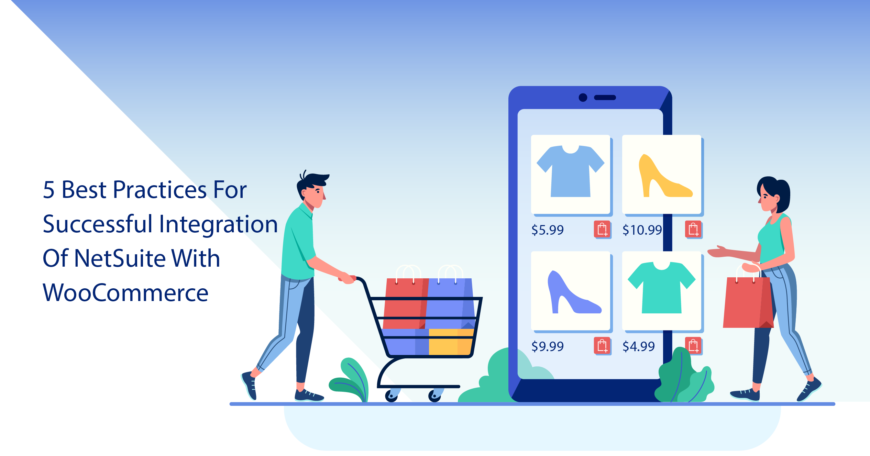Digital marketing and e-commerce are on the rise. Any company that isn’t jumping all in on the trend is consequently leaving money on the table. Companies leveraging the unprecedented growth of digital sales will likewise be set up for more long-term success.
E-commerce sales accounted for 18% of all retail sales in 2020. In 2024, that number could rise to 21.8%. But as e-commerce comes into a company’s mix, the challenge sometimes lies in connecting the new channel to the rest of the company’s operations. The key lies in finding the right tools to bring all e-commerce activities into a dashboard for all staff to access and work from.
WooCommerce and NetSuite
One of today’s most popular e-commerce systems is WooCommerce, an online shop plugin that works well with WordPress— the world’s biggest blog and website platform to date. In addition, companies attach WooCommerce to the rest of its operations by integrating it to NetSuite.
How does NetSuite help a business, and why do companies need it? NetSuite is a robust platform that allows companies to attach e-commerce activities to the rest of the company’s operation. It provides people from human resources, accounting, marketing, logistics, customer service, and operations access to a dashboard that gives them a better snapshot of how their e-commerce efforts pan out. Everyone can see everything, from sales, marketing performance, financials, customer data, order details, and so on.
Marrying these two tools— NetSuite and WooCommerce — provide a range of functionalities. But sometimes, it’s easier said than done. So here are some tips when integrating WooCommerce and NetSuite for business use.
Tip 1. Assign a Team to Lead Research and Roll-Out
Choosing the right WooCommerce NetSuite plugin is the first step. But first, a company will need to decide who makes that call. Assign a team to lead a study on connecting a WooCommerce account to a NetSuite account and how everyone will use them.
People in project management and technology should be a part of this group. However, considering the average business major salary today, some people might not have the capacity to hire someone full-time to run this operation. In cases like this, the business can simply assign an ad hoc committee to run this project for a given period. A company can also choose to outsource to an agency or consultant to take care of the process.
Tip 2. Optimize Your WordPress Website
Running a NetSuite WordPress integration will only be a worthy endeavor when the e-commerce website converts into sales. Create a beautiful website that has easy user experience. Putting in an effort to set up marketing efforts for the e-commerce site like search engine optimization or content marketing are also good ideas.
Overall, the website should provide value to people and be easy to use. Others might consider running a blog that lures people to visit the site. Another good idea would be to have a free giveaway like an e-book or guide on the site.
Tip 3. Build a Deep Integration
When creating an integration with NetSuite, it’s best to set up a deep integration. That means that you use a third-party tool or plugin that automatically sends data between the two programs. This decision removes any manual work and saves the company a significant amount of time and energy.
Tip 4. Use Automations
An advantage to using a business solution like Oracle NetSuite is that it brings a wide variety of automations to a business. These automations keep staff productive and help streamline operations. Here are just a few of the many automations a business can set up for their WooCommerce store with NetSuite.
- Accounts payable and other finance roles — Accounting teams can use NetSuite to follow up on accounts payable and other finance roles like payroll computation, bookkeeping, sales reporting, and so on.
- Email follow-up — Abandoned cart rate for websites is at 68.8% on average. With NetSuite, marketing teams can search for the customers that left their carts and target marketing efforts at them.
- Customer support — NetSuite also gives customer service teams a platform to automatically qualify concerns and bring them through a support process.
Tip 5. Integrate as Many Parts of Operations as You can
Creating a WooCommerce integration to NetSuite gives most if not all of your company’s departments a chance to streamline operations through the software. Here are how departments can benefit from a NetSuite and WooCommerce connection
- Finance gets accumulated reports from WooCommerce on sales, order sizes, and other accounting information.
- Fulfillment teams can use NetSuite to aggregate orders for ship out.
- Marketing can take business data from NetSuite to make informed promotions and branding decisions.
- Human resources can look at project progress and individual employee performance by checking how many tasks they fulfill and the timeliness.
All Businesses Can Apply WooCommerce and NetSuite
E-commerce isn’t something reserved for large corporations. Even small businesses can apply this plan into their context and experience all the benefits of WooCommerce and NetSuite integration.

E-commerce sales could grow to $5.4 trillion in 2022. So for any company that wants to be ready to take a slice of that pie, improving systems through integrations should be a part of their roadmap.
















